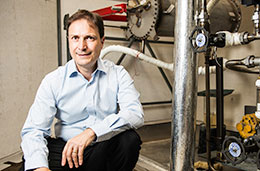21 June 2016
 A collaborative research funding partnership between the University of South Australia, the South Australian and Western Australian governments and Centrex Metals Limited is funding cutting edge molten salt technology that will significantly reduce energy and water usage, and therefore the cost of mineral processing using molten salts.
A collaborative research funding partnership between the University of South Australia, the South Australian and Western Australian governments and Centrex Metals Limited is funding cutting edge molten salt technology that will significantly reduce energy and water usage, and therefore the cost of mineral processing using molten salts.
The research, based around the Oxley Potassium Project and undertaken by UniSA’s School of Engineering and Future Industries Institute, will expand current molten salt research for solar energy applications into minerals processing and further strengthen engagement between the research sector and industry with a view to maximising successful technology development and commercialisation.
The UniSA research program will develop a minerals processing circuit to leach, extract and purify metals from silicate minerals in a solely molten salt environment, without the need for subsequent aqueous processing.
If the research successfully provides the ability for all processing steps to be undertaken in a molten salt environment it will significantly lower energy and water use and the associated costs.
UniSA Division of Information Technology, Engineering and the Environment (ITEE) Pro Vice-Chancellor Professor Simon Beecham says molten salt technology has been studied for more than a century but remains a cutting edge area of research.
“This project is a good example of research inspired by real-world challenges and opportunities, partnered with end-users, and underpinned by excellence,” Prof Beecham says.
“It involves UniSA researchers from a variety of disciplines, ranging from engineering to minerals processing, together with a South Australian industry partner to manufacture low-cost fertilisers.”
UniSA Associate Research Professor, Frank Bruno, who is leading the research project, says the challenges to providing proof of concept for the molten salt separation technology include mechanical and materials engineering issues involved with transferring and separating solids from highly-reactive molten salts at high temperatures.
“Currently, molten salts are being used commercially in the solar and nuclear industries at temperatures up to 600°C and while molten salts are used commercially at higher temperatures for batch style minerals roasting processes this project will develop novel technology for reaction, separation and purification processes in molten salts above 850°C,” Assoc Prof Bruno says.
“The knowledge developed in relation to the mechanical and materials engineering issues involved with transferring and separating solids from highly-reactive molten salts at high temperatures can be adopted in other applications such as solar power plants, high temperature thermal energy storage, molten salt reactors, glass optical property modification and refining for other minerals.”
South Australian company Centrex Metals Limited will use the technology to be the first commercial and cost competitive manufacturer of bulk potassium chloride fertiliser from potassium feldspar ore.
Centrex Metals Limited CEO, Ben Hammond says the technology will take advantage of the unique liquid properties of molten salt to not only convert metals within silicate ore to an extractable form, but also separate and purify them without the need for aqueous processing, saving energy, water and reducing the overall project footprint.
“It will allow us to look at competing in the bulk fertiliser space for our globally unique large scale potassium feldspar deposit at Oxley, creating more long-term jobs in Australia’s currently struggling mining industry,” Hammond says.
“The Minerals Research Institute of Western Australia (MRIWA) and the Mining Industry Participation Office of South Australia (MIPO) have committed grant funding for the first stage, with a further funding application to be made at stage completion.”
Between Centrex, the Minerals Research Institute of Western Australia and the Mining Industry Participation Office of South Australia, $464,000 of external funding will support UniSA’s work on the first two stages of the proposed three stage research program
Media contact: Katrina McLachlan office +61 883020961 mob 0414972537 email katrina.mclachlan@unisa.edu.au




